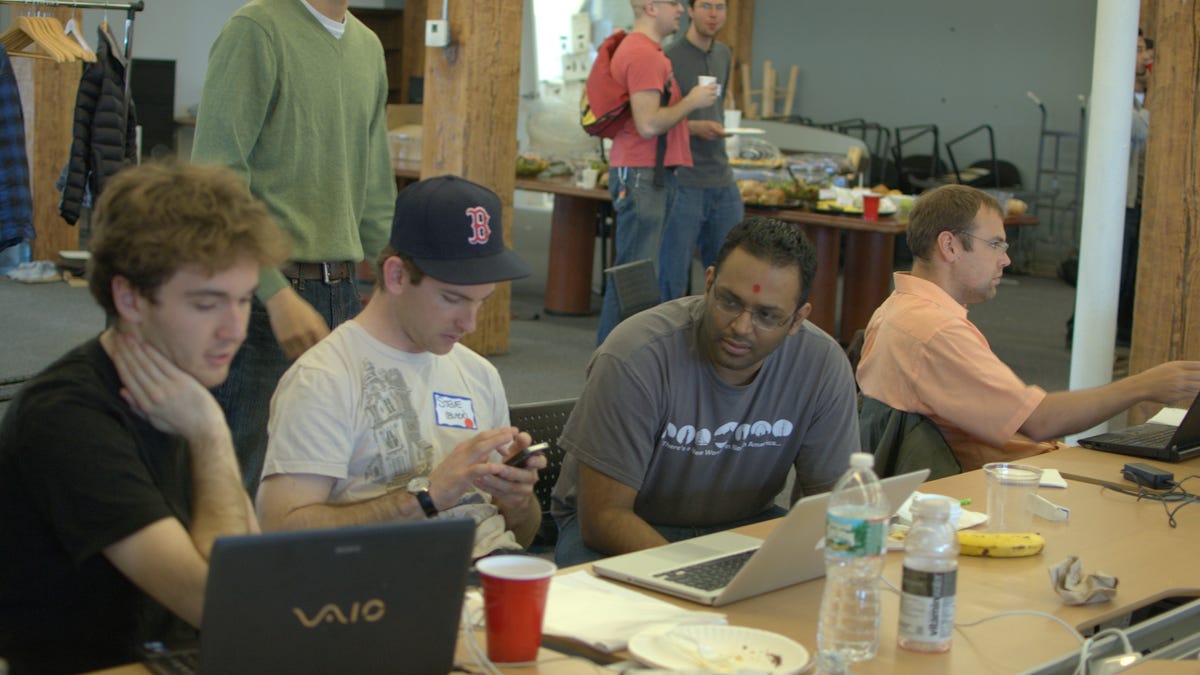The future of clean tech? Try hacking code
The idea of the "cleanweb," or using IT to deal with energy and resource problems, gains ground among entrepreneurs and VCs at weekend hackathon.

BOSTON--Internet, meet clean tech.
A weekend hackathon here showcased the promise -- and limits -- of applying mobile and Internet software development toward efficiency. To advocates, the "cleanweb" will succeed where clean tech fell short.
The Cleanweb hackathon, held in a warehouse-turned tech incubator in South Boston, on Sunday afternoon finished up a day and a half of furious coding by about 80 programmers, with some spending the night to finish their demos.
The 16 teams presented a very varied set of applications but they have one thing in common: they all seek ways to use natural resources more efficiently and improve consumer convenience. The top prize was $11,000.
The winning entry and crowd favorite was a funny video game called Michael Tyson's Punch House, which creates an animated arcade game out of electricity data. A person submits his or her household against a randomly selected home of the same size to compete in real time over which uses less electricity. Rematches are available or the matches can last for longer periods, its creators said.
The source of the data was Green Button, a simple voluntary standard created by the Department of Energy and now used by a growing number of utilities for formatting electricity usage history.
Second place went to Ride With Me, an app that lets people arrange car-sharing using a Facebook log-in and friend networks. Third place went to Divia Energy, which developed a solar panel energy-savings calculator for its online marketplace to get bids on solar installations. See the full list of "hacks" hosted on Hacker League.
Given that ad hoc groups of people created these apps over a weekend, you wouldn't expect venture capitalists to hand over big checks to any of the teams on the spot. But some of the ideas had potential to be more fully developed, particularly those that used Green Button or other public sources of energy data.
Utility data has remained largely untouched for decades beyond simply billing customers and cleanweb apps often try to use that data and other sources in new ways. For example, one hack at the Boston hackathon allowed people to quickly compare utilities in markets with competition. Another project called ActiveGreenScore is a social app to track how much users walk and bike versus driving.
Making good on clean tech
Many of the sponsors for the event were venture capital companies, a reflection of how clean-tech investing has dramatically shifted in the past few years away from expensive, hardware-centric companies.
In the wave of green-tech investing that began last decade, many VCs backed solar, biofuel, or electric vehicle startups without always having a clear plan for commercializing their inventions. One of the main challenges with investing in these manufacturing-oriented businesses is the cost to scale up the company after the product has been designed.
High capital requirements has forced some generalist venture capital firms, which dabbled in green tech, into retreat. Then the failure of solar company Solyndra and the partisan attacks on national, clean-energy policies spooked large institutional investors as well, venture capitalists say.
Cleanweb companies are created with the same idea of making energy cleaner and improving the environment as previous clean-tech companies. But instead of taking on difficult materials science or manufacturing challenges, they are focused on specific niches, whether it be renting out an apartment, helping consumers find energy-efficient appliances, or bartering locally grown food.
The cleanweb "makes good on clean tech," said Blake Burris, the chief coordinator of Cleanweb Hackathon, which is organizing hackathons in Houston, Paris, Boulder, Colo., and Santa Clara, Calif., in the coming months. Instead of developing yet-another photo-sharing or Foursquare app, people can tackle big societal challenges, such as transportation, using technology from mobile, gaming, and social media, he said. There have been two other cleanweb hackathons in San Francisco and New York.
This weekend's hackathon showed a high level of energy and enthusiasm from participants and organizers. With enough clever and creative apps, bridging Internet technologies with clean tech could have a big impact.

